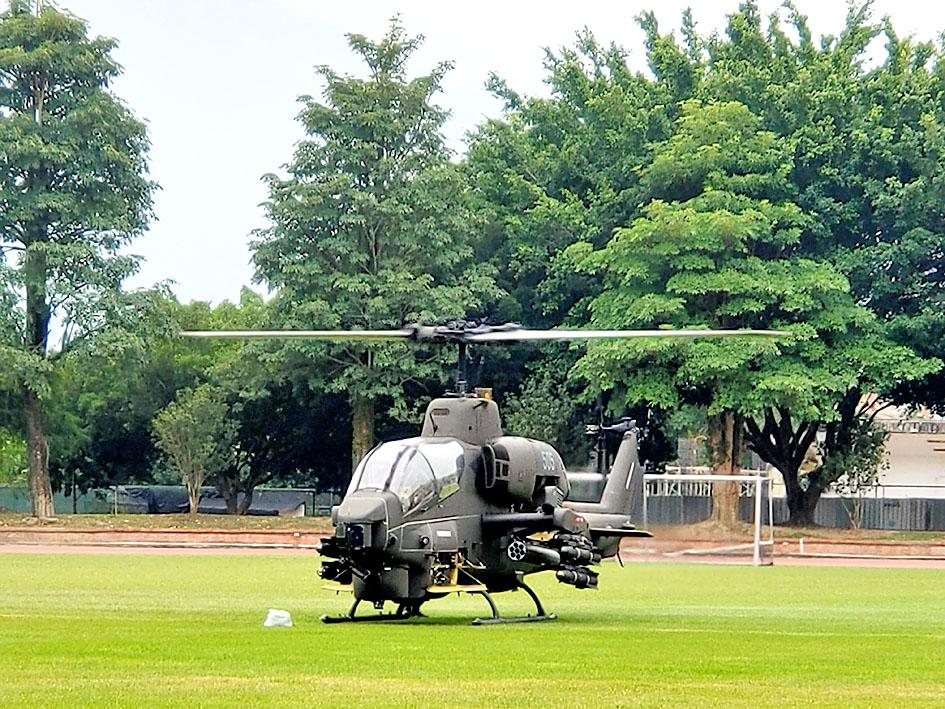The Ministry of National Defense has signed a NT$339.24 million (US$11.91 million) contract with the US to maintain the army’s Bell AH-1W SuperCobra attack helicopters, public information on the government’s procurement platform showed.
The contract was signed by a military delegation and the American Institute in Taiwan to secure spare parts and technical support for the army’s AH-1Ws until Sept. 30, 2027, an official said yesterday on condition of anonymity.
The military is replacing the AH-1W with the AH-1Z Viper, but is concerned over potential safety issues such structural aging, even though the legacy fleet’s operational readiness is satisfactory, the official said.

Photo: Tung Chen-kuo, Taipei Times
Some parts are no longer manufactured since the US Marine Corp decommissioned its last AH-1W in October last year, the official said.
Taiwan bought a three-and-a-half year supply of parts for NT$1.46 billion in 2019, which would last until the middle of next year, the official said.
Taiwan bought 42 AH-1Ws in 1992 and another batch of 21 in 1997, although two aircraft were lost due to accidents.
The AH-1Ws are deployed by two attack helicopter squadrons of the 602nd Air Cavalry Brigade.

Alain Robert, known as the "French Spider-Man," praised Alex Honnold as exceptionally well-prepared after the US climber completed a free solo ascent of Taipei 101 yesterday. Robert said Honnold's ascent of the 508m-tall skyscraper in just more than one-and-a-half hours without using safety ropes or equipment was a remarkable achievement. "This is my life," he said in an interview conducted in French, adding that he liked the feeling of being "on the edge of danger." The 63-year-old Frenchman climbed Taipei 101 using ropes in December 2004, taking about four hours to reach the top. On a one-to-10 scale of difficulty, Robert said Taipei 101

Nipah virus infection is to be officially listed as a category 5 notifiable infectious disease in Taiwan in March, while clinical treatment guidelines are being formulated, the Centers for Disease Control (CDC) said yesterday. With Nipah infections being reported in other countries and considering its relatively high fatality rate, the centers on Jan. 16 announced that it would be listed as a notifiable infectious disease to bolster the nation’s systematic early warning system and increase public awareness, the CDC said. Bangladesh reported four fatal cases last year in separate districts, with three linked to raw date palm sap consumption, CDC Epidemic Intelligence

Two Taiwanese prosecutors were questioned by Chinese security personnel at their hotel during a trip to China’s Henan Province this month, the Mainland Affairs Council (MAC) said yesterday. The officers had personal information on the prosecutors, including “when they were assigned to their posts, their work locations and job titles,” MAC Deputy Minister and spokesman Liang Wen-chieh (梁文傑) said. On top of asking about their agencies and positions, the officers also questioned the prosecutors about the Cross-Strait Joint Crime-Fighting and Judicial Mutual Assistance Agreement, a pact that serves as the framework for Taiwan-China cooperation on combating crime and providing judicial assistance, Liang

US climber Alex Honnold left Taiwan this morning a day after completing a free-solo ascent of Taipei 101, a feat that drew cheers from onlookers and gained widespread international attention. Honnold yesterday scaled the 101-story skyscraper without a rope or safety harness. The climb — the highest urban free-solo ascent ever attempted — took just more than 90 minutes and was streamed live on Netflix. It was covered by major international news outlets including CNN, the New York Times, the Guardian and the Wall Street Journal. As Honnold prepared to leave Taiwan today, he attracted a crowd when he and his wife, Sanni,